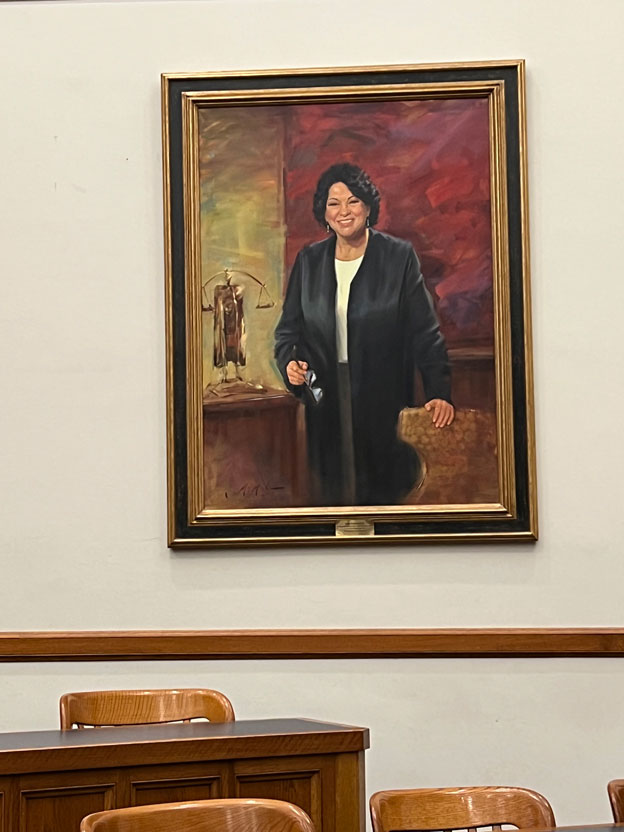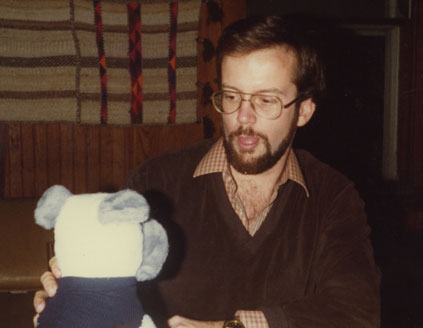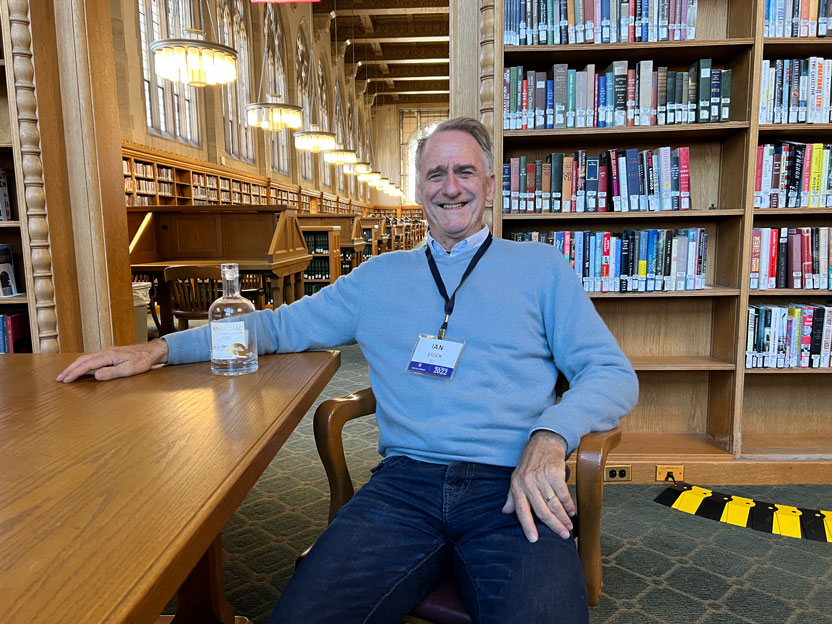My 40th class reunion in October 2022 should have been an exciting prospect, but Yale Law School has been in the news recently, the national news, and in the wrong way. Living on a relatively fixed income in rural France, I could easily have decided not to attend, but Lisa’s daughter Shannon and her family, husband Greg and two adorable granddaughters, live near New Haven. Lisa hadn’t seen the family for a year, and they were happy to put us up for the reunion weekend and then some.

So I decided to attend after all, even if I couldn’t ignore the warning signs of recent events at the school, both of which offended my free speech sensibilities.
First, Trent Colbert, a native American law student, sent invitations for a party co-sponsored by the Native American Law Students Association and the Federalist Society. The party was to be held in a “trap house” and feature Popeye’s chicken. This language “triggered” complaints from other law students who felt that the description had racist overtones, and the law school administration jumped all over Trent, pushing him to formally apologize.

His reaction, reasonably enough, was to offer to meet with each complaining student to discuss the issues. I’m not sure if that ever happened. Whatever lead the administration and several students to treat what was at worst adolescent language in poor taste as something to be officially sanctioned? Had the school promoted the kind of dialog that Trent suggested? It should have, and should have said so.
Second, two practicing constitutional lawyers, one from the left and one from the right, were invited to the school by the Federalist Society (them again!) to debate what conduct and speech violates the First Amendment. It’s easy to agree on the principle that free speech is good while believing different things about what it covers. On some meta level, that is the point.

Perhaps a hundred students disrupted the right-leaning speaker, Kristen Waggoner, a devout Christian who argues First Amendment cases before the Supreme Court, for maybe ten minutes before leaving when finally instructed to do so. The presentation did continue after the disruptive students’ departure, but when students at a law school disrupt an invited speaker because of her beliefs, rather than debating those beliefs with her, something is very wrong.
Don’t the students see the irony? Shouting down a debate about free speech in a law school!
The ambivalence that I felt before the reunion may have influenced how it went. The tooth that was extracted on the Friday afternoon probably didn’t help either!
But Lisa’s and my other activities also interfered with the flow of the weekend. We were in the front row to watch Todd Rundgren, Adrian Belew and crew pay their tribute to David Bowie on the Friday night. Great concert, but as a result we missed most of the class dinner happening at the same time which was the official start of the festivities.

Then on Saturday afternoon, no faculty member was available to host our class discussion, a surprising lacuna in a formal segment of reunion activities. In my capacity of joint chair of the Social Committee for our 40th reunion (an inexplicable appointment if ever there was one!), I asked if instead we could talk with a few current students about what they are thinking. That kind of dialog made my years as a student, but this time the talk didn’t happen. There was no response from the administration, except to say that “we’re thinking about it.”
The theme of avoiding rather than nurturing dialog was continuing.

Instead, we each spoke about our professional transitions and how we were looking at retirement, which is pending or happening for most of us. That was fun, hearing about who has been doing what, especially the people I haven’t seen for ten years or more.
To cite a few stand-outs, Sam Coppersmith is a retired congressman, Dave Lowenthal is a psychiatrist at Columbia, Charlie Robinson is General Counsel for the University of California, and Judy Kimmerling blew the whistle on Chevron’s devastating impact on the Amazon’s ecosystem.
Judy interned for the Conservation Law Foundation in 1980, and Shannon, Lisa’s lawyer daughter, is a VP for the Foundation now!

The dinner on Saturday evening was the high spot of the weekend. My most significant contribution was two bottles of 40 year-old Armagnac, found at a little specialty store in Dinan near where we live. It was luscious! And toasting old friends was equally warm, even if fewer attended than had attended earlier reunions.
Thanks to Dave Lewis, my first-year roommate in the dorm, for his reminder that Meatloaf’s “Bat Out Of Hell” was my favorite album that year. And I thought that it had been “Darkness on the Edge of Town!” Memory is so fickle.
Things deteriorated after the dinner. Lisa and I went on to the Omni, where the post-dinner after-party was supposed to occur, and no-one in the class of 1982 was there. That was deflating.
I also missed the Sunday brunch, the last official reunion engagement, because I thought erroneously that it was scheduled for 11, and in fact it was at 10. That too was deflating; my own fault, perhaps more deflating.

It is possible that the following observations reflect the deflating end of the weekend.
But real inner-city New Haven still starts only a few blocks from the law school, and it still embodies the inner-city poverty and misery, here mostly among minority groups, that followed the export overseas of factory employment after World War II. As a student, I was scared to walk more than a couple of blocks from campus, and would still be today.
Yet Yale’s endowment is now around $42 billion. Total Yale endowment in 1985, three years after I graduated, was around $1 billion. I assume that the law school’s endowment has also multiplied by about 40 during that period to its current $1.2 billion.
In other words, becoming more progressive has had little or no effect on the discrepancy between the law school’s relative wealth and inner-city New Haven’s relative poverty.
If anything, the current self-conscious self-flagellation (“I want to share how much I deeply regret my white privilege!”) distracts those who could help fix that disparity, or leads them to believe that by their insight alone they are fixing it. Not so. Insight has its limits unless it leads to action.

On the opposite side of history, and of political effectiveness, is the Federalist Society, a national group of activists on the right. Its 40th anniversary dinner was held in Washington a couple of weeks after my class’s 40th reunion dinner.
And it was founded by Steve Calabresi at Yale Law (class of 1983), and a couple of his friends then at Chicago and Harvard law schools. He was the nephew of a popular Yale professor. The Society’s first introductory conference, called “A Symposium on Federalism: Legal and Political Ramifications” was held at Yale in April 1982, a month before we graduated. At the time, from the outside it looked quaint, even a bit silly.
The Society’s name itself was coined by my classmate and friend George Paul, who was working informally with Steve because they both shared an appreciation for free market economics, and in particular the Austrian School of economics, featuring Ludvig von Mises. He had developed many of the general principles which animated free market economics. George and Steve discussed naming the society the “Von Mises Society,” but decided, with obvious good sense, that the name lacked something. George suggested the Federalist Society, which had equally obvious appeal despite its lack of connection to free market economics. And so it began!
To quote Wikipedia on the Society now: “In January 2019, The Washington Post Magazine wrote that the Federalist Society had reached an ‘unprecedented peak of power and influence.’ Of the current nine members of the Supreme Court of the United States, six are current or former members of the organization (Brett Kavanaugh, Neil Gorsuch, Clarence Thomas, John Roberts, Samuel Alito, and Amy Coney Barrett).”

The success of the Society in its role of provocateur (see e.g. its law school interventions discussed earlier) cannot obscure that three US Supreme Court Justices attended its 40th anniversary dinner in person! Wikipedia again: “Politico wrote that the Federalist Society ‘has become one of the most influential legal organizations in history—not only shaping law students’ thinking but changing American society itself by deliberately, diligently shifting the country’s judiciary to the right.’”

I will always be grateful to Yale Law School for an extraordinary and mind-opening education. My small group first year was constitutional law taught by a conservative, Professor Ralph Winter, who later became Chief Judge of the Second Circuit Court of Appeals. We didn’t always get along, for example on the merits of minimum wage laws, but I learned a lot! On the other side, Burke Marshall, formerly Assistant Attorney General for civil rights under Bobby Kennedy, taught the First Amendment and Federal Jurisdiction. Wow!

My biggest surprise this reunion was an edge in the air which I don’t remember from prior years among the people from our first year dorm, who made up almost half the attendees and have been friends for many years. I couldn’t figure out whether this reflected the increased polarization of US society generally, or whether my classmates and I are getting older and more set in our ways.
In any event, if I’m still here in ten years, I’ll be a better attendee at our 50th reunion.

